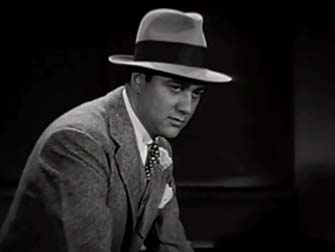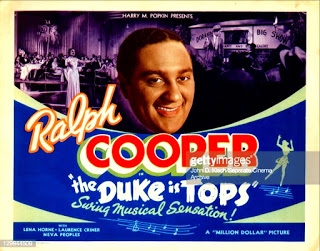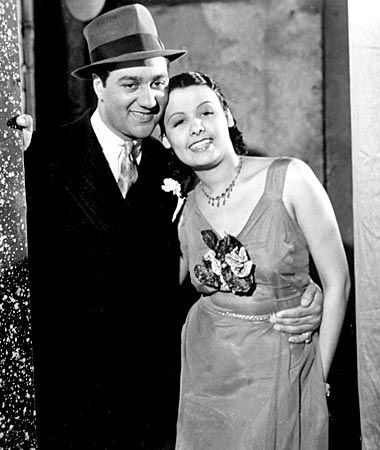

The “Dark Gable” of Race Films
Ralph Cooper (January 16, 1908 – August 4, 1992), was an African American actor, screenwriter, dancer and choreographer. Cooper is best known as the original master of ceremonies and founder of amateur night at the famous Apollo Theater in Harlem, New York Cityi in 1935. He wrote, produced, directed and acted in ten motion pictures. Titles include, “The Duke Is Tops,” “Dark Manhattan,” “Gangsters on the Loose” and “Gang War.” Because of his debonair good looks, he was known as “dark Gable” in the 1930s.

In July 1935, Cooper started the Apollo’s Amateur Night which ran every Wednesday night. In 1937, Cooper formed Million Dollar Productions with black actor George Randol and white producers Harry Popkin and his brother Leo Popkin to produce race films that he often starred in, wrote, produced and directed. Film scholar Tino Balio has written that, “Million Dollar, more than any other company, moved black filmmaking away from a marginalized form towards the mainstream, advancing considerably its reputation and ability to attract audiences.”
The History of Million Dollar Productions

The history of Million Dollar Productions Inc., was written (or at least signed) by Harry Popkin and put in a time capsule that was secreted inside the cornerstone of the Val Verde Park pool house on April 16, 1939. The Los Angeles County Parks Department opened the capsule in 1994 during a renovation project and photographed the contents in 2014. (view document here)
In 1937, the white Los Angeles theater owner Harry M. Popkin and his movie-producer brother Leo C. Popkin teamed up with the black actor Ralph Cooper to form Million Dollar Productions. Picking up where the pioneering black filmmaker Oscar Micheaux (1884-1951) left off.
Cooper, who had founded amateur night at the Apollo Theater in Harlem in 1935, had been brought out West by 20th Century Fox “but was immediately dropped when he didn’t fit the desired stereotype”.
In the end, Ralph Cooper and Fox parted ways. That having been said, his time at Fox was not wasted. While at the studio he learned many of the technical skills necessary to make movies, including directing, screenwriting, set design, lighting, and so on.
Ralph Cooper tried interesting the Hollywood studios in making films with all-black casts to no avail. Having received no response from the studios, he then formed Randol-Cooper Productions with fellow actor and producer George Randol. Randol-Cooper Productions produced Dark Manhattan (1937), a gangster movie with an all-black cast. Dark Manhattan was positively revolutionary. Not only was it the first black gangster movie, but it was one of the earliest African American films to be set in the modern day in an urban setting. When the film was shown at the Apollo Theatre, it broke all attendance records for the venue.
Dark Manhattan would be the only film that Randol-Cooper Producitons would make, but Ralph Cooper was hardly out of the business of producing movies. Now, Million Dollar Productions would use the crime/gangster genre as a vehicle to make Cooper a star of black cinema.

Harry Popkin (1906-1991) was already featuring many African American performers on stage and in film at his Million Dollar Theater at 307 S. Broadway in Los Angeles. Built by Sid Grauman — Grauman’s first theater, opening in February 1918 with William S. Hart’s “The Silent Man” — Popkin bought the place in 1935. In the 1940s, stage acts ran the integrated gamut from Billie Holliday and Lionel Hampton to Artie Shaw.

Million Dollar Productions didn’t last all that long — its film-making days were over by 1942 — but it created a lasting legacy in 1938 when it paired Cooper with a hitherto-unknown actress in “The Duke is Tops.” Nine or 10 months later, when Harry Popkin penned the history that was unearthed in the time capsule, he obviously didn’t know what he had. He mentions the long-forgotten film — and its male lead — by name, but he doesn’t mention its costar. Her name was Lena Horne.

Popkin leased the premises of Million Dollar Productions in 1945 to Metropolitan Theatres, which added it to the Orpheum vaudeville circuit and booked such acts as the Nat King Cole Trio. Around 1949 it was subleased to Frank Fouce, who turned it into a major, long-running Spanish-language film house and Mexican vaudeville theatre. Fouce and partners would acquire many media companies in the coming decades, eventually selling them in 1986 for $301 million to Hallmark Cards, which rebranded them as Univision.
